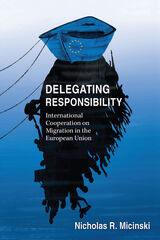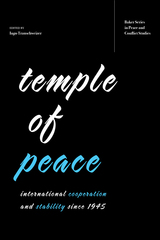
Delegating Responsibility explores the politics of migration in the European Union and explains how the EU responded to the 2015–17 refugee crisis. Based on 86 interviews and fieldwork in Greece and Italy, Nicholas R. Micinski proposes a new theory of international cooperation on international migration. States approach migration policies in many ways—such as coordination, collaboration, subcontracting, and unilateralism—but which policy they choose is based on capacity and on credible partners on the ground. Micinski traces the fifty-year evolution of EU migration management, like border security and asylum policies, and shows how EU officials used “crises” as political leverage to further Europeanize migration governance. In two in-depth case studies, he explains how Italy and Greece responded to the most recent refugee crisis. He concludes with a discussion of policy recommendations regarding contemporary as well as long-term aspirations for migration management in the EU.

With the end of the Cold War, will the space race become a cooperative venture? This book, which tells the story of the European Space Agency, shows how such a cooperative enterprise has worked over the past three decades and how it might apply to future space science.
Linking fifteen European nations, the European Space Agency offers a working model of scientific, technological, and political cooperation on an international scale. Roger M. Bonnet and Vittorio Manno give us an insiders’ view of the agency—its beginnings as the European Space Research Organization, its development in the face of early difficulties, and its daily operations. Covering thirty years, this account traces the evolution of ESA’s programs, facilities, and capabilities and the establishment of its scientific, technological, industrial, and political policies and objectives. With an eye to future global space activities, the authors detail ESA’s relationships with its own member states and with other countries, particularly the United States. The history of cooperation between ESA and NASA as exemplified by two specific projects—Ulysses and the international space station—highlights the difficulties of associating different decision-making bodies and political systems.
Illustrated with pictures and diagrams, enlivened with anecdotes involving key world players in space science, this book provides a rich blend of factual information and personal recollection, history and interpretation. A timely contribution to the study of the politics of science and technology, it points the way to future international cooperation.

READERS
Browse our collection.
PUBLISHERS
See BiblioVault's publisher services.
STUDENT SERVICES
Files for college accessibility offices.
UChicago Accessibility Resources
home | accessibility | search | about | contact us
BiblioVault ® 2001 - 2024
The University of Chicago Press









